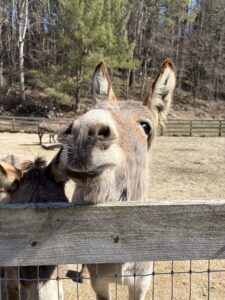
A Lesson from Nature’s Quiet Teachers
Who knew donkeys could teach such deep Torah?
This past week, many former BJ Rabbinic Fellows gathered for a reunion retreat in the woods of Connecticut to reconnect, learn from each other, pray together, and celebrate the joy of being part of the extraordinary community that is BJ. It was a profound blessing to spend time with so many wise rabbis who share an orientation toward Jewish life that is vulnerable, open, honest, and deep. I know I speak for more than a few of us when I say that my soul was refreshed from the experience.
The retreat center where we stayed is also a donkey sanctuary (yes, you read that right!), and there are six donkeys who live in a barn on the property. Our hosts encouraged us to spend time with the donkeys: “it’s part of the experience of our retreats,” we were told when we arrived. “Donkeys can stare into your soul and tell you exactly where you are, and exactly what you need.” It was a lofty invitation, and so as the sun set on our first evening, Anina and I went down to the barn to say hello.
 Donkeys are often described as “soulful,” capable of reflecting a disarming depth of emotion in their large, gentle eyes. And these donkeys—delightfully named after characters from the television shows The Simpsons and Arthur—lived up to their reputation. There was a quiet intelligence in their gaze, a steady presence that seemed to capture years of experience. Being in their presence as the sun set behind the trees, the noise of the world faded away. It was just us and the donkeys. My breathing slowed, my mind settled.
Donkeys are often described as “soulful,” capable of reflecting a disarming depth of emotion in their large, gentle eyes. And these donkeys—delightfully named after characters from the television shows The Simpsons and Arthur—lived up to their reputation. There was a quiet intelligence in their gaze, a steady presence that seemed to capture years of experience. Being in their presence as the sun set behind the trees, the noise of the world faded away. It was just us and the donkeys. My breathing slowed, my mind settled.
For a split second, as I stared into their kind, soulful eyes, my mind was clear.
I was reminded of a passage from the book of Job that discusses the wisdom of the natural world:
וְֽאוּלָ֗ם שְׁאַל־נָ֣א בְהֵמ֣וֹת וְתֹרֶ֑ךָּ וְע֥וֹף הַ֝שָּׁמַ֗יִם וְיַגֶּד־לָֽךְ׃
But ask the animals, and they will teach you;
The birds of the sky, they will tell you,
א֤וֹ שִׂ֣יחַ לָאָ֣רֶץ וְתֹרֶ֑ךָּ וִיסַפְּר֥וּ לְ֝ךָ֗ דְּגֵ֣י הַיָּֽם׃
Or speak to the earth, it will teach you;
The fish of the sea, they will inform you.
מִ֭י לֹא־יָדַ֣ע בְּכׇל־אֵ֑לֶּה כִּ֥י יַד־יְ֝הֹוָ֗ה עָ֣שְׂתָה זֹּֽאת׃
Who among all these does not know
That the hand of the Lord has done this?
אֲשֶׁ֣ר בְּ֭יָדוֹ נֶ֣פֶשׁ כׇּל־חָ֑י וְ֝ר֗וּחַ כׇּל־בְּשַׂר־אִֽישׁ׃
In His hand is every living soul
And the breath of all mankind. (Job 12:7-10)
The verses speak to the wisdom of nature itself, and the power that the natural world has to bring us humans to a deeper consciousness, and a deeper connection with the Divine. In those quiet moments that we spent with the donkeys, I felt closer to God and to prayer than I have in a long time. The animals’ simplicity and steadfastness created spaciousness in my mind, and helped me connect more deeply with how I was truly feeling in the moment. In the stillness of their stare, there was a vulnerability, a connection that wordlessly invited openness in my soul. I found myself reflecting on the word “ayekha” (where are you)—the question God asked Adam as he hid in the Garden of Eden. The question was a theme of our retreat, and it seeks a deep answer: Where are you, really? Where is your soul? Where are your dreams? Where are you stuck? Where are you free?
This Shabbat is Shabbat HaHodesh, the Shabbat when we announce the arrival of the month of Nisan and begin the countdown to Pesah. In a few weeks, many of us will consider the classic connection that our tradition makes between the words Mitzrayim (Egypt) and meitzar (“straits” or “narrows”), and we will reflect on the spiritual constriction from which we need to emerge in our own lives. We will ask: What are the depths from which I need to call out? What are the straits in which I find myself? From what do I need to break free?
As we turn toward this season of personal and communal liberation, consider adding a question to that list: what might I need to experience or encounter in order to start down that path from narrowness to expansiveness?
I invite you to get curious about the rituals, Jewish practices, or even animals in your life that truly bring you closer to these questions. Some of us find that quiet place in tefillot or study, and some of us will resonate best in different environments. The moments I shared with the donkeys this week invited me onto the path. How might you begin the journey?
The psalmist wrote,
מִֽן־הַ֭מֵּצַר קָרָ֣אתִי יָּ֑הּ עָנָ֖נִי בַמֶּרְחָ֣ב יָֽהּ׃
From the narrow place I called out to God, and God answered me from the expanse. (Psalm 118:5)
In the coming weeks, may we each seek and find that place of expansiveness, and may we be open to finding it in surprising places. After all, you never know what kindly barn animal might awaken your soul!
Shabbat Shalom,

Joe Blumberg

